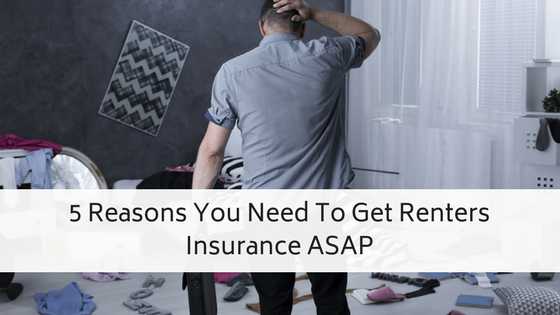
Just because you’re a renter doesn’t mean your belongings don’t have as much value as a homeowner’s. Nor does it mean you don’t have to protect them with insurance.
Most homeowners would never go uninsured, but when it comes to renters, more often than not they don’t even give it a second thought. Consider this: according to an Insurance Information Institute report from 2016, 95% of homeowners had homeowners insurance yet only 41% of renters had renters insurance. And this number is better than in 2011, when only 29% of survey respondents said they had renters insurance. This data comes from an ever-increasing population of renting Americans. Millennials, in particular, have been putting off home-ownership, whether it’s because they want to first pay off hefty student loan debt or because they don’t want to carry a mortgage, or they want to prioritize other big expenses. Either way, with more Americans renting, it means more people’s valuables are going unprotected in their (rented) homes.
Don’t think you need renter’s insurance? According to esurance, the average renter has around $20,000 in personal property and is 25% more likely to be a victim of a burglary than a homeowner. It doesn’t help that landlords and apartment complex owners will only cover damage that happens to the physical structure and not the belongings inside. If a pipe breaks, damaging the walls, you’ll get new sheet-rock but you won’t get a new television. But that’s not the only reason why you need renters insurance. From the fact that it’s cheap to the need to protect your guests, here’s a look at why you absolutely need renters insurance.
Reasons Why Renters Insurance is a Must-Have
1. It Protects Your Stuff
One of the most basic, and obvious reasons renters should get insurance is because it protects their stuff if it is stolen, damaged, or if there is a fire in the apartment. Most renters insurance policies also cover your belongings from power surges, water damage, and other calamities that were not caused by you. Most of the insurance policies on the market won’t protect you from a flood, earthquake, or some other natural disaster. If you live in an area prone to flooding, there are supplemental insurance policies that can give you more coverage. For instance, renters can take out extra sewer or drain backup coverage, earthquake coverage, and insurance riders if you own rare art, pricey jewelry or something of a lot of value that exceeds what the standard plan covers.
 When it comes to how much you can insure your belongings for, most insurance companies set limits on how much you’ll get back. Insurees can choose between replacement cost coverage and actual cash value for the personal property coverage portion of the plan. With replacement cost coverage you get the current market value for your damaged or stolen valuables. With actual cash value coverage, it takes into account how old the item is and will often payout less than the market value. If your five-year-old flat panel TV burns in a fire you’re not going to get enough from the insurance provider with an actual cash value policy to purchase a brand spanking new TV. Replacement cost coverage doesn’t take into account depreciation but can result in a more expensive insurance plan.
When it comes to how much you can insure your belongings for, most insurance companies set limits on how much you’ll get back. Insurees can choose between replacement cost coverage and actual cash value for the personal property coverage portion of the plan. With replacement cost coverage you get the current market value for your damaged or stolen valuables. With actual cash value coverage, it takes into account how old the item is and will often payout less than the market value. If your five-year-old flat panel TV burns in a fire you’re not going to get enough from the insurance provider with an actual cash value policy to purchase a brand spanking new TV. Replacement cost coverage doesn’t take into account depreciation but can result in a more expensive insurance plan.
2. It Covers Your Guests’ Injuries
Just because you live in an apartment doesn’t mean your visitors won’t slip on a wet floor or get bit by your seemingly cute dog. If any of the above happens, it could require some pretty hefty outlays on your part if you’re held responsible for covering doctors and medical bills.
One way to avoid that from happening, and likely damaging your relationship with your guests, is to get renters insurance coverage. In addition to protecting your valuables, it can safeguard your visitors, too. Most renters policies protect you from liability for any injuries that happen on your rental property and help cover the costs of any legal ramifications. Renters insurance policies typically provide a minimum of $100,000 of liability coverage and anywhere from $1,000 to $5,000 to cover medical payments. You can raise the amount if you have particularly clumsy friends or a misbehaved pet. After all, we live in a litigious society and it’s not uncommon for best friends to become enemies over an injury and subsequent medical care and bills. Avoid all of that by preemptively investing in renters insurance.
3. Can’t Go To Work, Renters Insurance Got You Covered
Damage to an apartment from a fire or flood can be extensive in some cases, requiring the tenant to find temporary housing. That can be costly, especially if the only option you have involves staying in a hotel or other location that requires you to pay.
Dealing with the aftermath of a damage-causing event to your home can also be time-consuming, requiring you to take time away from work. All of that costs money that renters insurance can help with. Part of many renters policies is loss of use protection. If the apartment is damaged to an extent where you can’t live there, the insurance policy will cover your living expenses, such as food and housing, during the time you are not allowed in your apartment.
4. It’s Cheap
Renters insurance won’t break the bank. Many people opt out of the protection, figuring it’s going to cost more than what their valuables are worth. But it turns out renters insurance is pretty cheap with the average cost around $187 a year. That amounts to about $15.60 a month. It will vary depending on the state you live in. For instance, according to ValuePenguin renters insurance will cost about $118 or $9.83 a month in South Dakota and $244 or $20.33 in Mississippi.
5. It May Be a Landlord Requirement
These days it’s not uncommon for a landlord to require a tenant to take out renters insurance as a requirement to renting out the property. Some states allow landlords to make the requirement mandatory, making renters insurance as common as providing a security deposit and background check.
States that allow landlords to make it a requirement do have safeguards in place to protect renters. For instance, in Virginia, the annual costs of the renter’s insurance and the security deposit can be more than two months’ rent. For landlords in Oregon, they can force renters to purchase $100,000 worth of liability insurance for their apartment or rental, but the landlord has to have the same policy and be able to provide it if tenants want to see it.
Final Thoughts
To some, renters insurance may seem like an added cost that gives little in terms of return. After all, the chances of damaging belongings or people in your apartment may be slim. But it does occur.
And if it happens to you and you don’t have the protection you could be on the hook for a lot of cash. A renters insurance policy can give you loads of peace of mind and it can cost less than $20 a month. Whether or not it’s worth it depends on the value of the things in your rental—unless it’s a requirement to rent the property outright.




